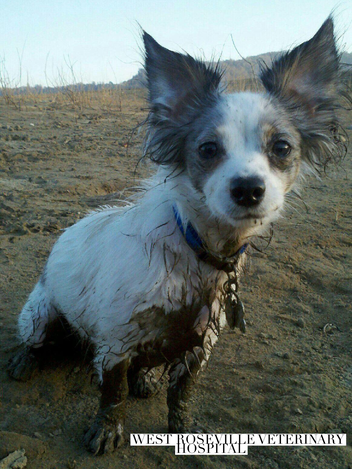Leptospirosis Information

Due to the wet weather, both the environment to harbor the bacteria has increased and the high ground water levels are driving rodents in particular closer to homes and pets. We are having increasing incidents of confirmed cases throughout the country and specifically confirmed positive cases in the Roseville area.
What is it?
Leptospirosis is a bacterium that is primarily found in water, or wet areas.
What does it do?
It can cause kidney and liver failure in pets and it is transmissible to people. The symptoms that you may see are; loss of appetite, vomiting, weakness.
Where does it come from?
It is spread in the urine of animals, commonly rodents, opossums, skunks, cattle. The bacterial can live for long periods of time in water and is easily picked up in stagnant pools. This can be open water, puddles, or urine on concrete.
How can my pet get it?
It can be picked up by drinking water or from inhaling when animal smell urine on the ground. So the biggest risk areas are moisture on solid surfaces such as concrete and stagnant pools of water such as ponds, puddles and edges of rivers.
Is it dangerous to people?
Yes. People most frequently contract it through inhaling particles when cleaning up urine from their pets, or from contact with rodent urine.
So who should get their dogs vaccinated?
In the current environment with the heavy rains we are recommended vaccinating dogs of any age that have not previously had a confirmed adverse reaction to this vaccine.
Who should consider vaccination?
Nearly everyone should consider having their dog vaccinated at this time. We will gladly evaluate your dog’s personal medical history and let you know if we have any concerns, otherwise we are encouraging everyone to vaccinate their dogs this spring.
Vaccination, some myth’s and facts
Leptospirosis vaccine is greater than 80% effective. It is different from the vaccines that many people are familiar with, distemper, parvo and rabies vaccine are all viruses, leptospirosis is a bacteria. The vaccine does not create an immunity that is as long lasting and needs to be boostered every year.
Some of you may have heard the vaccine is dangerous, or small dogs should never get it. This is not true. It is a slightly more reactive vaccine than the rabies vaccine, but the risk of reaction is not as high as people think, and far lower than the danger of contracting infection. Small dogs do have a slightly higher incidence of vaccine reactions than large dogs, but it is not a problem for small dogs overall.
If you have questions do not hesitate to contact West Roseville Veterinary Hospital for advice.